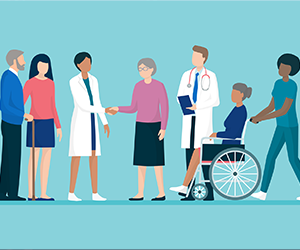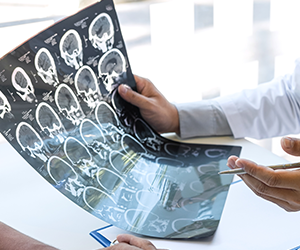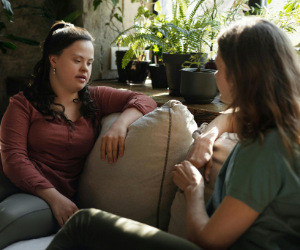Disability Competent Care | Behavioral Health
Courses within this series focus on best practices for recognizing, diagnosing, and treating mental and behavioral health needs in persons with disabilities through cultural and linguistic competence and humility.
Learning audiences include Behavioral health providers (behavioral health professionals, aides, peers, and unlicensed and licensed staff) practicing in Colorado's behavioral health system and other health providers, such as public health professionals and medical providers who also screen for psychological conditions. Further, this series is appropriate for caregivers, parents, and the general public.
To enroll in all available DCCBH courses, select this link.
Review individual courses below.
Popular Courses

Disability Cultural Competency for Behavioral Health Providers (DCCBH) | Full Enrollment
View Details

Diagnostic Over Shadowing
This course for behavioral health providers offers a deep dive into the unique needs of individuals with intellectual and developmental disabilities (I/DD), focusing on mitigating diagnostic overshadowing. Central to the course is an examination of diagnostic overshadowing; participants will explore its definition and multifaceted concerns. Participants will learn about the complexities that hinder accurate diagnoses and tailored interventions, such as gatekeeping tendencies and barriers to accessing healthcare. By exploring co-occurring diagnoses, we will analyze essential definitions and considerations that are crucial for accurate assessment and intervention planning, laying the groundwork for nuanced care provision.
Delving into assessment considerations will equip you with practical strategies for navigating the complex diagnostic landscape for individuals with I/DD. By the end of this course, you will have the knowledge and tools needed to navigate the complexities of I/DD care, reduce diagnostic overshadowing, and provide holistic, culturally sensitive support to individuals with I/DD, ultimately enhancing your capacity to deliver effective, person-centered care.
View Details

Neurodiversity
1 in 36 individuals in the U.S. is autistic. This course is designed to provide knowledge and skill development for individuals working with neurodivergent clients. It covers common characteristics of autistic individuals with average to above-average cognitive abilities and risk factors, including associated medical concerns and suicide.
Additionally, treatment, research, and cultural considerations are discussed to develop cultural competency skills when serving this population group.
View Details

Culturally Responsive Care in Behavioral Health for Deaf and Hard of Hearing Communities
This course delves into the unique experiences, needs, and challenges encountered by Deaf, DeafBlind, DeafDisabled, and Hard of Hearing communities in accessing medical healthcare. Participants will gain insights into deafness and Deaf culture, enabling them to identify barriers to care, understand health disparities, and implement standards of care to promote equitable health outcomes. Emphasizing the significance of a linguistically and culturally responsive approach in clinical practice, the course guides participants in developing tailored action plans to better serve Deaf and Hard of Hearing patients. Through a combination of research-based readings, observational learning, and practical exercises, learners will acquire the knowledge and skills needed to enhance healthcare equity and outcomes for these communities.
View Details

Supporting Relationships and Sexual Health in People with Intellectual & Developmental Disabilities
This course aims to equip participants with the knowledge and tools to provide relationship and sexual health support to individuals with Intellectual and Developmental Disabilities (IDD). By the end of the course, participants will be able to identify challenges faced by people with IDD in developing relationships and managing sexual health. They will learn to integrate support strategies addressing development, intimacy, consent, and safe internet practices.
Additionally, participants will identify relevant resources for assisting individuals with IDD and will develop a treatment considerations plan for educating them about engaging in healthy relationships and safe sexual activities.
View Details

Interpretation Services in Behavioral Health: Best Practices, Recommendations, and Requirements
View Details

Exploring the Link Between Substance Abuse and Brain Injuries
Traumatic brain injury (TBI) often goes undiagnosed in patients who have a substance use disorder (SUD), but it's actually quite common. At least one in five people with a substance use disorder may also experience the effects of a brain injury.
This is often an invisible disability. This course will give you the knowledge you need to identify, understand, and help your patients prevent and manage their symptoms.
View Details

Decision-Making Options
Welcome to Decision-Making Options training, presented by the Colorado Department of Health Care Policy & Financing.
This course provides an overview of the legal and practical aspects surrounding decision-making options for individuals with disabilities. It specifically focuses on individuals with intellectual and developmental disabilities, who are more often placed under restrictive decision-making arrangements.
Whether you are a medical professional, behavioral health provider, or anyone involved in the care and support of individuals with disabilities, this course will equip you with the knowledge to understand and properly communicate the decision-making options available to individuals in the state of Colorado.
View Details

Brain Injury in Children and Youth
Many youth with brain injuries may experience difficulties with emotional regulation due to changes in brain function. As a behavioral health professional, you should be prepared to provide immediate and long-term care that includes strategies and support to help youth manage emotions to effectively cope with frustration, anger, anxiety, and depression, among other things.
This course is designed to provide you with knowledge and skills to better understand and support children and youth who have experienced brain injuries. It covers a wide range of topics, including types and classifications of brain injuries, special considerations for working with children and youth, an in-depth look at the school system and academic supports, and specific case studies to illuminate how to work with youth with mild, moderate, and severe brain injuries. Through this course, you will gain a deeper understanding of the impact of brain injuries on a child or youth’s life, including physical, cognitive, and emotional consequences, and come away with tools to help support the individual’s specific needs.View Details
